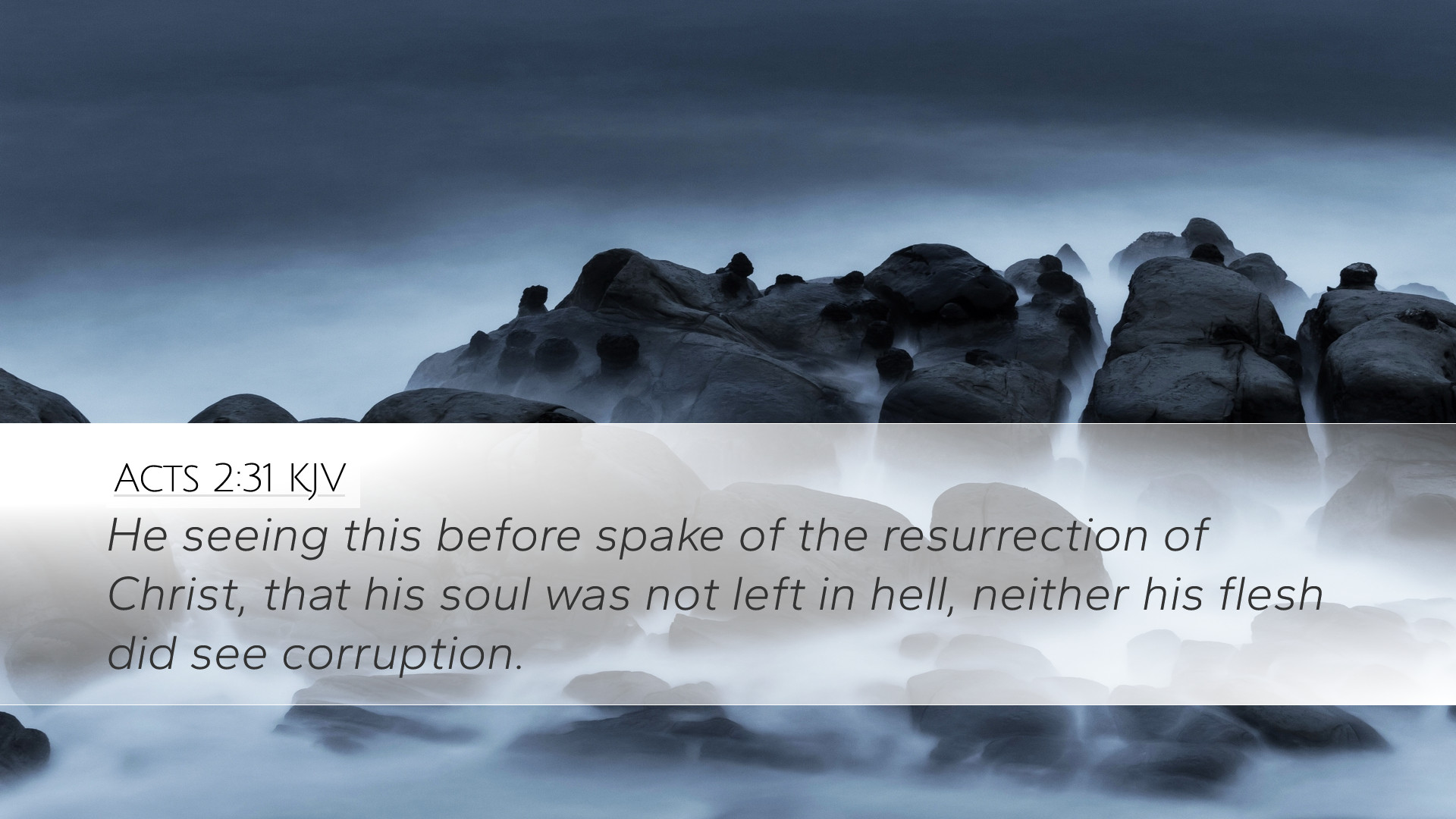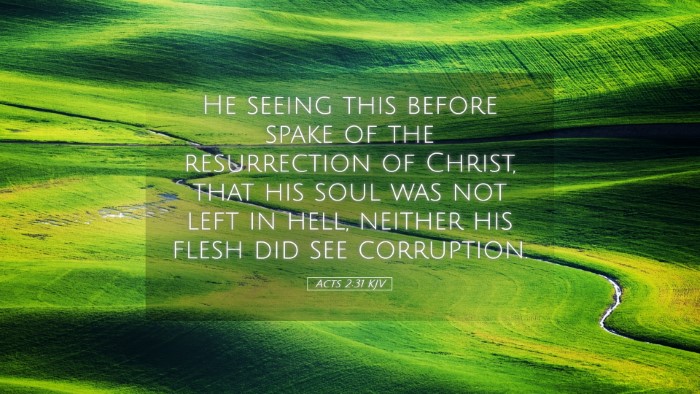Acts 2:31 - Commentary Summary
Bible Verse: "He seeing this before spoke of the resurrection of Christ, that his soul was not left in hell, neither his flesh did see corruption." (Acts 2:31)
Introduction
The verse from Acts 2:31 emerges from a significant moment in the early church, where Peter provides a powerful sermon on the day of Pentecost. This statement emphasizes the prophetic nature of Jesus' resurrection as foretold by King David, enhancing the theological understanding of the resurrection and its implications for both Jews and Gentiles. This commentary aims to synthesize insights from public domain scholars such as Matthew Henry, Albert Barnes, and Adam Clarke to provide a well-rounded perspective on this profound verse.
Contextual Background
The context of Acts 2 is essential to grasp the depth of Peter's proclamation. Earlier in this chapter, the disciples receive the Holy Spirit, and Peter addresses the crowds regarding this miraculous event. He establishes the legitimacy of Jesus’ resurrection, grounding it in prophecy and the fulfillment of Scripture.
Prophetic Insight
Matthew Henry notes that Peter appeals to the prophecy of David found in Psalm 16:10, emphasizing that David, being a prophet himself, foresaw the resurrection of Christ. This link between David and Jesus illustrates that the resurrection was not a mere happenstance but a divine preordination that affirmed Jesus' messianic identity.
Understanding 'Hell'
Albert Barnes expands on the term "hell" used in this verse, explaining that in this context, it refers not to the eternal hell but to the grave or Hades. The original Greek term conveys a state of death rather than eternal punishment, thus helping to elucidate the nature of death that Jesus experienced. His soul was not left in this state, indicating that death could not hold Him.
The Importance of Resurrection
Adam Clarke emphasizes the significance of the resurrection in Christian doctrine, stating that it is the cornerstone of faith. Without the resurrection, the death of Christ would be meaningless. His victory over death signifies that He not only conquered sin but also death itself, enabling believers to possess the hope of eternal life.
Theological Implications
The theological ramifications of Acts 2:31 are profound and wide-reaching. The resurrection serves as a foundation for Christian belief, influencing doctrines of eschatology, soteriology, and Christology. Here are some key implications noted by various commentators:
- Hope for Believers: The resurrection provides assurance to believers of their future resurrection, instilling hope in the face of mortality.
- Validation of Christ's Divinity: The resurrection is a divine affirmation of Jesus' identity as the Son of God and the promised Messiah, established through prophecies.
- Fulfillment of Scriptures: Peter’s reference to David exemplifies how the New Testament consistently fulfills Old Testament prophecies, underscoring the unity of Scripture.
Practical Applications
For pastors, students, and scholars, the teachings found in Acts 2:31 serve as a catalyst for deeper reflection on the resurrection's relevance today. Here are practical applications worth considering:
- Emphasizing Resurrection in Teaching: Pastors can focus on how the resurrection shapes preaching and teaching, promoting the hope it offers.
- Encouragement During Trials: In pastoral care, the truth of the resurrection can provide comfort and encouragement to individuals facing suffering or loss.
- Engagement with the Prophetic Texts: Further study into the Old Testament prophecies about the Messiah can enhance understanding and appreciation of the biblical narrative.
Conclusion
Acts 2:31 encapsulates a critical aspect of the Christian faith: the resurrection of Jesus Christ. Drawing from the insights of Matthew Henry, Albert Barnes, and Adam Clarke, we see that this verse not only fulfills the prophetic words of David but stands as a testament to God's sovereignty, holiness, and redemptive plan for humanity. For those engaged in ministry or scholarly pursuits, this passage offers rich theological depth and practical applications that resonate through the ages.


